#corrosion inhibitor
Text
The benefits of using soluble oil in machining operations
Machining operations involve the use of cutting tools to shape and refine various types of metal. This process generates a lot of heat, friction, and metal debris, which can have a detrimental effect on both the tool and the material being worked on. One way to mitigate these issues is through the use of soluble oil as a lubricant and coolant during the machining process. In this blog, we'll explore the benefits of using soluble oil in machining operations.
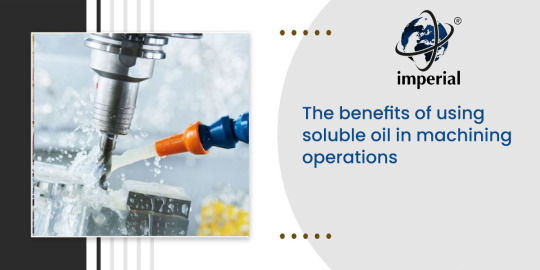
Enhanced Tool Life: The primary benefit of using soluble oil in machining operations is that it helps to extend the life of cutting tools. The oil acts as a lubricant, reducing the friction between the tool and the metal being worked on. This reduces the amount of wear and tear on the tool, which in turn increases its lifespan. By using soluble oil, you can reduce the frequency of tool changes, which can save time and money.
Improved Surface Finish: Soluble oil also helps to improve the surface finish of the material being worked on. The oil helps to reduce the heat generated during the machining process, which can cause distortion and other defects in the material. By using soluble oil, you can produce a smoother, more even surface finish, which can be critical in many applications.
Increased Cutting Speeds: Using soluble oil can also allow you to increase cutting speeds without compromising the quality of the finished product. The oil acts as a coolant, dissipating heat and reducing the risk of thermal damage to the material. This can allow you to push the limits of your cutting tools and achieve higher productivity rates.
Reduced Metal Debris: The use of soluble oil can also help to reduce the amount of metal debris generated during the machining process. The oil acts as a lubricant, helping to prevent the metal from sticking to the cutting tool. This can reduce the amount of metal debris that is generated and make the cleanup process easier.
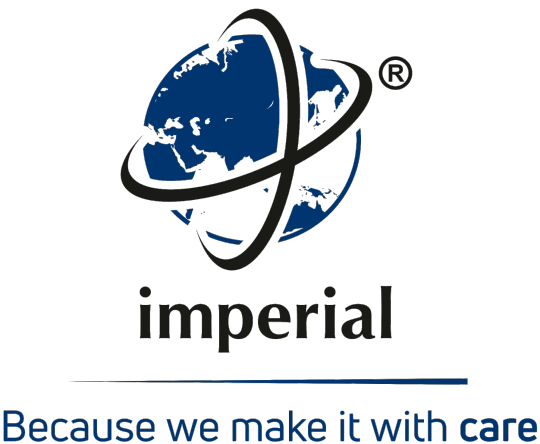
Environmentally Friendly: Finally, soluble oil is an environmentally friendly option for machining operations. Unlike some other types of coolants, soluble oil is water-soluble and biodegradable, which means it won't harm the environment when it's disposed of properly.
In conclusion, using soluble oil in machining operations can provide a range of benefits, from improving tool life and surface finish to increasing cutting speeds and reducing metal debris. If you're not already using soluble oil in your machining process, it's worth considering as a way to improve the efficiency and quality of your operations.
6 notes
·
View notes
Text
How Glycol Antifreeze Coolant with Corrosion Inhibitor & Antiscalant is beneficial to Automotive and Industrial Systems?
In the realm of cooling technology, glycol antifreeze coolants have gained widespread recognition for their superior thermal properties and protective benefits.
How do these coolants manage to occupy special recognition and stand out as a versatile and efficient solution that ensures optimum performance and an extended lifespan for various cooling systems?
Simply through • Heat Transfer Efficiency, • Boil and Freeze Protection, and • Scale and Corrosion Inhibition Properties.
Glycol Antifreeze coolants is composed up of glycol, water and other preservatives. The most commonly used in these formulations are ethylene and propylene glycol. These glycols are used to increase the bandwidth of freezing as well as vaporizing point. Glycol has a lower freezing point than water. A mixture of glycol and water can remain in a liquid state at lower temperatures than pure water, preventing the coolant from freezing in cold climates. This property is crucial in preventing damage to the cooling system, such as engine blocks, radiators, and pipes, which can crack or burst when water freezes and expands. Glycol has a higher boiling point than water, which means it can operate effectively in high-temperature conditions without evaporating. This property is essential for preventing the cooling system from overheating and maintaining optimal engine operating temperatures.

Major Application Areas
Automotives: Used in engine cooling systems to prevent freezing and overheating.
HVAC (Heating, Ventilation, and Air Conditioning): Ensures efficient heat transfer and freeze protection in cooling towers and chillers.
Industrial Cooling Systems: Used in process cooling applications to prevent freezing and enhance heat transfer efficiency.
Refrigeration: In commercial and industrial refrigeration systems for temperature control and protection against freezing.
Food Processing: In applications where non-toxic propylene glycol-based coolant is preferred for indirect contact with food products.
Aerospace: Used in aircraft and aerospace applications to prevent freezing and overheating in hydraulic systems and other cooling systems.
Data Centers: Helps maintain stable operating temperatures in data centers and server rooms.
Solar Thermal Systems: Used as heat transfer fluid to carry and transfer thermal energy in solar thermal systems.
Ice Rinks: Used to create and maintain ice surfaces in ice skating rinks.
Winterization: In various applications to protect equipment, pipes, and tanks from freezing during cold weather conditions.
Chemtex Speciality Ltd is an esteemed manufacturer, supplier and exporter of glycol antifreeze coolants, which are a result of meticulous chemical formulation, combining water with either ethylene glycol or propylene glycol. The products offer a comprehensive solution to the challenges of cooling system operation. With its efficient heat transfer capabilities, corrosion and scale inhibition, and customizability, it enhances the efficiency and longevity of cooling systems across various industries. By leveraging on these coolant formulations, businesses can optimize performance, reduce maintenance costs, and ensure the reliable operation of their cooling systems.
Some other key features of these coolants in cooling systems are:
Optimum Heat Transfer Efficiency: Efficiently absorbs and dissipates heat in automotive applications, industrial processes, and power generation, where effective heat transfer is essential for preventing overheating and maintaining optimal performance.
Enhanced Corrosion Inhibition: Create a protective layer on metal surfaces within the cooling system, and act as a corrosion and rust inhibitor for different metals, extending the life of the equipment and reducing the risk of costly repairs.
Versatility: By adjusting the glycol concentration and adding suitable additives, engineers can optimize the coolant for diverse applications, ranging from automobile engines to HVAC systems.
Stability: Maintain its effectiveness and chemical properties over time, ensuring reliable and consistent performance in cooling systems.
For more information, please visit https://www.chemtexltd.com/products-and-solutions/heat-transfer-fluid/coolant/
0 notes
Text
How do we clean ro membranes?
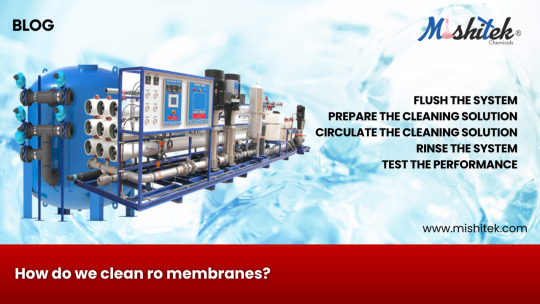
RO (reverse osmosis) membranes are commonly used for desalination and purification of water. Over time, the accumulation of contaminants on the surface of the membrane can decrease its performance and efficiency. To restore the performance of the RO membrane, cleaning is required. Here are the general steps involved in cleaning an RO membrane:
Flush the system:
Before cleaning the RO membrane, the system should be flushed with clean water to remove any loose debris or particles.
Prepare the cleaning solution:
The cleaning solution used for the RO membrane depends on the type and severity of the fouling. Commonly used cleaning solutions include citric acid, sodium hypochlorite, and EDTA (ethylendiaminetetraacetic acid). The solution should be prepared according to the manufacturer’s instructions and mixed with water.
Circulate the cleaning solution:
The cleaning solution should be circulated through the RO system for a specified time period, usually between 30 minutes to several hours. The circulation can be done manually or with a specialized cleaning system that pumps the solution through the system.
Rinse the system:
After the cleaning solution has been circulated, the system should be rinsed with clean water to remove any residual cleaning solution.
Test the performance:
After the cleaning process is completed, the performance of the RO membrane should be tested to ensure that it has been restored to its optimal efficiency.
It is important to follow the manufacturer’s guidelines and recommendations for cleaning the RO membrane. Overuse or misuse of cleaning solutions can damage the membrane and decrease its lifespan. In addition, it is recommended to conduct regular maintenance and cleaning of the RO system to prevent the accumulation of contaminants and prolong the life of the membrane.
RO CHEMICALS AT MISHITEK CHEMICALS FOR MEMBRANE CLEANING
Every reverse osmosis maintenance programme must include RO membrane cleaning. Understanding the type of foulant and the available cleaning solutions is typically necessary for effective cleaning. Foulants on the membrane surface can result in flux loss (permeate flow), an increase in differential pressure, a rise in product water conductivity, the need for higher feed pressure to sustain output, or any combination of these effects.
MEMBRANE CLEANER MT 111 LIQUID (AC)
https://i0.wp.com/mishitek.com/wp-content/uploads/2023/04/Membrane-Cleaner-MT-111-Liquid-AC.png?w=2384&ssl=1
It is an organic acid cleaner for removal of heavy mineral scales from membranes. Membrane cleaners MT 111 are used to clean fouled or contaminated membranes in various industrial and commercial applications such as water treatment, desalination, and food and beverage production.
MEMBRANE CLEANER MT 121 LIQUID (AK)
https://i0.wp.com/mishitek.com/wp-content/uploads/2023/04/Membrane-Cleaner-MT-121-Liquid-AK.png?w=2384&ssl=1
It is High grade alkaline cleaner for removal of biofilm & organic foulants from membrane surface. These are used to remove organic fouling, biofilms, and some inorganic foulants. Examples include sodium hypochlorite, hydrogen peroxide, and permanganate.
BIOCIDE MT BIO DE LIQUID (BC)
https://i0.wp.com/mishitek.com/wp-content/uploads/2023/04/Biocide-MT-BIO-De-Liquid-BC.png?w=2401&ssl=1
Biocides MT BIO De Liquid are sometimes used in reverse osmosis (RO) systems to control microbial growth and prevent biofouling. Biofouling occurs when microorganisms such as bacteria, fungi, and algae attach to the membrane surface and form a biofilm, which can lead to reduced water flow, decreased salt rejection, and increased energy consumption.
FOOD GRADE PH BOOSTER MT GOLD+
https://i0.wp.com/mishitek.com/wp-content/uploads/2023/04/Food-Grade-PH-Booster-MT-Gold.png?w=2367&ssl=1
FOOD Grade pH booster may be used in reverse osmosis (RO) systems to increase the pH of the feed water and prevent membrane scaling or fouling. However, when selecting a pH booster for use in an RO system, it is important to choose a product that is food-grade and safe for consumption if the RO system is used for producing potable water.
CONCLUSION
Reverse osmosis (RO) membranes are widely used for water purification and desalination in various industries and applications. The RO process involves passing feed water through a semipermeable membrane that selectively removes dissolved salts, contaminants, and impurities.
Mishitek Chemicals, Use Various types of RO Water Treatment chemicals such as antiscalants, membrane cleaners, biocides, and pH boosters may be used in RO systems to prevent scaling, fouling, and microbial growth. However, it is important to choose food-grade, safe, and effective chemicals and to follow the manufacturer’s instructions and recommended dosages to avoid damaging the membranes or reducing their lifespan.
0 notes
Text
Guardians of Durability: Imperialchem - Leading Corrosion Inhibitors Manufacturer and Supplier in Vadodara and Gujarat, India
Imperialchem stands tall as the go-to source for Corrosion Inhibitors in Vadodara and across Gujarat. As a trusted Corrosion Inhibitor Manufacturer in India, we take pride in delivering solutions that safeguard against deterioration. Elevate your protection standards with Imperialchem, your dedicated Corrosion Inhibitor Supplier known for excellence in the best chemical company in Vadodara. Trust Imperial Oilfield Chemicals Private Limited for reliability that preserves and enhances the longevity of your assets.
#Corrosion Inhibitor in Vadodara#Corrosion Inhibitors Manufacturer in India#Corrosion Inhibitor Supplier in Vadodara#Corrosion Inhibitor Supplier in Gujarat#Best chemical company in#Best chemical company in Vadodara#Chemical
6 notes
·
View notes
Text
Vci Films
VCI (Volatile Corrosion Inhibitor) BagsVCI Bags by Modwrap are the perfect way to keep your electronics safe from moisture and other corrosive agents.
A VCI works by building up an effective concentration of vapors in an enclosed space. The bags are made of a special material impregnated with a volatile corrosion inhibitor.
This substance prevents corrosion by forming a barrier between the…
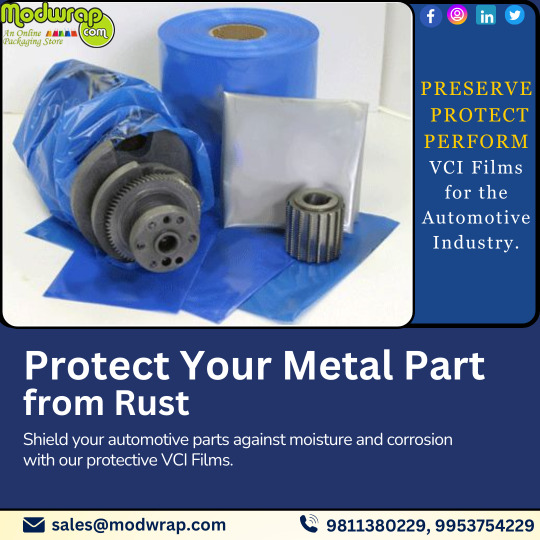
View On WordPress
#vci bags#vci film manufacturer#vci films#vci packaging#vci packaging film#volatile corrosion inhibitor
0 notes
Text
Vci Films
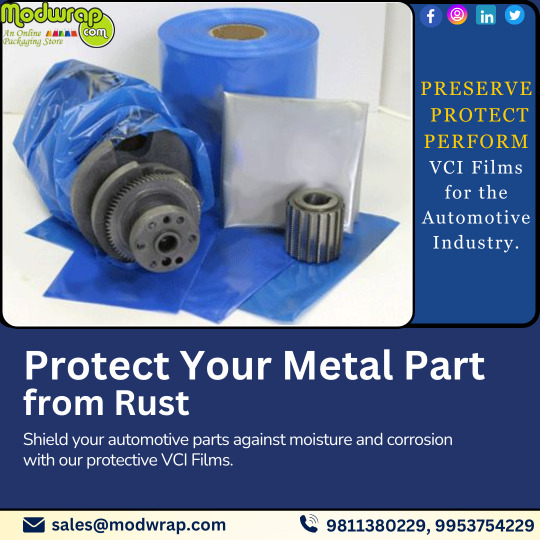
VCI (Volatile Corrosion Inhibitor) Bags
VCI Bags by Modwrap are the perfect way to keep your electronics safe from moisture and other corrosive agents.
A VCI works by building up an effective concentration of vapors in an enclosed space. The bags are made of a special material impregnated with a volatile corrosion inhibitor.
This substance prevents corrosion by forming a barrier between the metal and the atmosphere. The bags are available in various sizes to fit your needs.
Features:
Prevents articles from moisture and corrosive agents
Keep the metal parts clean and ready for immediate use.
Ideal for the Automotive Industry, Electronic Industry & Metal Part's Anti Rust Packaging.
#volatile corrosion inhibitor#vci films#vci packaging#vci bags#vci packaging film#vci film manufacturer
0 notes
Text
Safeguarding Your Copper Investments - Copper Corrosion Inhibitor
Specializing in Copper Corrosion Inhibitors, Lube Performance Additives offers advanced formulations that shield against corrosion, prolonging the lifespan of equipment. Count on Lube Performance Additives for dependable solutions, ensuring peak performance and longevity in critical applications. For more information, visit lubeperformanceadditives.com/lubricants/Corrosion_Inhibitor_Additive
0 notes
Text
Finding the Best Oilfield Chemicals Manufacturer and Exporter in India: A Comprehensive Guide
If you're in the oil and gas industry, you know how crucial it is to use high-quality oilfield chemicals. These chemicals help enhance the productivity and efficiency of your operations, ensuring that your business remains profitable. However, finding the right Oilfield chemicals manufacturer and exporter in India can be a challenging task. With so many companies to choose from, it's tough to know where to start.
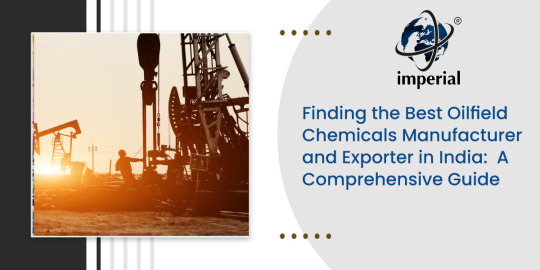
In this blog, we'll provide you with a comprehensive guide to finding the best oilfield chemicals company in Vadodara, Gujarat. We'll cover everything from the qualities to look for in a manufacturer to the benefits of working with a local supplier.
Qualities to Look for in an Oilfield Chemicals Manufacturer in India:
When searching for an oilfield chemicals manufacturer in India, there are several factors you should consider. Here are a few qualities to look for in a reputable supplier:
Experience – Choose a company with extensive experience in the oil and gas industry. This way, you can be confident that they have the knowledge and expertise to create high-quality chemicals that meet your specific needs.
Quality Assurance – The best oilfield chemicals companies in India have a robust quality assurance process in place to ensure that their products meet the highest standards. Look for a company that follows strict quality control procedures, adheres to industry regulations, and has relevant certifications.
Product Range – Select a manufacturer with a broad range of oilfield chemicals to choose from. This way, you can find all the chemicals you need in one place, saving you time and money.
Why Choose a Local Oilfield Chemicals Manufacturer in Vadodara, Gujarat. While there are many oilfield chemicals manufacturers in India, working with a local company has several advantages, including:
Better Communication – When you work with a local oilfield chemicals manufacturer, you can communicate more effectively. You can easily visit their facility, meet with their team, and discuss your requirements face-to-face.
Cost Savings – Local manufacturers can offer competitive prices because they don't have to factor in shipping costs or import taxes. Additionally, they may offer discounts for bulk orders.
Faster Delivery – When you choose a local manufacturer, you can expect faster delivery times. This way, you can receive your chemicals quickly, reducing downtime and increasing efficiency.
Conclusion:
In conclusion, finding the best oilfield chemicals manufacturer and exporter in India requires careful research and consideration. Look for a company with extensive experience, a robust quality assurance process, and a broad product range. Additionally, consider working with a local supplier in Vadodara, Gujarat, to benefit from better communication, cost savings, and faster delivery times. By following these guidelines, you can find a reliable supplier that can help enhance the productivity and efficiency of your oil and gas operations.
#Business#oil and gas industry#oil and gas companies#oil and gas pipeline#chemical#chemical product#chemical industry#chemical companies#exporter#manufacturer#oil products#oil companies#oil industry#chemical solution#corrosion inhibitor#flow improvers#drag reducing agents#pour point depressants#demulsifiers#wax and asphaltene inhibitors#Oilfield chemicals manufacturer in India#Oilfield chemicals exporter in India#Best Oilfield chemicals company in vadodara#Best Oilfield chemicals company in Gujarat#Leading Oilfield Chemicals#Manufacturer and Exporter in India#chemical engineering
4 notes
·
View notes
Text
Volatile Corrosion Inhibitors Packaging Material Market: Navigating the Landscape of Smart Packaging for Corrosion Prevention
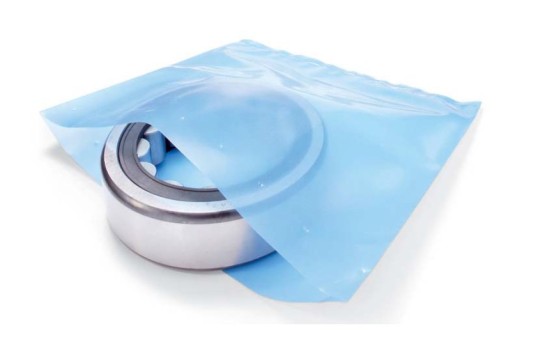
The Volatile Corrosion Inhibitors (VCI) Packaging Material Market is estimated to be valued at US$ 826 Mn in 2023 and is expected to exhibit a CAGR of 6.2% over the forecast period 2023 to 2030, as highlighted in a new report published by Coherent Market Insights.
Market Overview:
Volatile Corrosion Inhibitors packaging materials release protective vapors which coat metallic surfaces inside the package and shield them from corrosion. The coating prevents direct contact between air and unpacked metal components, thus effectively inhibiting corrosion. VCI packaging materials find major application in protecting ferrous and non-ferrous metals during storage and transit. They provide cost-effective corrosion protection compared to traditional methods.
Market Key Trends:
Growing emphasis on eco-friendly product trends is driving demand for Volatile Corrosion Inhibitors packaging materials market. Traditional VCI films utilize nitrites as core corrosion inhibitors which have environmental concerns. Leading manufacturers are focusing on developing bio-based and non-nitrite VCI films using natural corrosion inhibitors such as fatty acids from plant oils. For instance, Cortec Corporation produces biodegradable VCI films from corn and other biomass. Such eco-friendly product innovations are boosting the adoption of VCI packaging for sustainable corrosion protection of metal parts and components.
Porter’s Analysis:
Threat of new entrants: The VCI packaging material market has moderate threat of new entrants as it requires substantial R&D investment and compliance with various packaging regulations.
Bargaining power of buyers: The bargaining power of buyers is moderate to high as there are numerous established players providing VCI packaging solutions. Buyers can negotiate on prices and quality standards.
Bargaining power of suppliers: The bargaining power of suppliers is moderate as raw material suppliers such as plastics and paper manufacturers have established presence. However, volatility in raw material prices can affect the industry.
Threat of new substitutes: Threat of new substitutes is low as VCI packaging effectively protects against corrosion for metallic components during storage and transport.
Competitive rivalry: High as major players compete on product quality, innovation, and global expansion.
SWOT Analysis:
Strength: VCI packaging provides effective corrosion protection and extends product shelf life. It is a sustainable and recyclable solution.
Weakness: High material and production costs. Supplier dependency on raw materials.
Opportunity: Growing automotive, electronics, and industrial sectors driving the need for robust corrosion protection during international shipments. Development of bio-based and environment-friendly VCI films.
Threats: Stringent regulations regarding use of certain chemicals in packaging. Economic slowdowns reducing manufacturing output.
Key Takeaways:
The global Volatile Corrosion Inhibitors (VCI) Packaging Material Market is expected to witness high growth, exhibiting CAGR of 6.2% over the forecast period, due to increasing investment in manufacturing sector globally. North America dominates the VCI packaging material market currently due to major automotive and electronics production. Asia Pacific is expected to grow at fastest pace due to expanding manufacturing hub and growth in exports from China and India.
North America accounts for over 30% of the global VCI packaging material market share currently owing to huge manufacturing output in United States. Asia Pacific VCI packaging material market led by China, Japan, and India is anticipated to expand at fastest CAGR of 7.5% through 2030 on back of increasing automotive and electronics FDI investments in the region.
Key players operating in the VCI packaging material market are Cortec Corporation, Branopac GmbH, Armor Protective Packaging, Protective Packaging Corporation, Nefab Group, Daubert Industries, Inc., Zerust Excor, and Metpro Group. The major players are focusing on new product development, global expansion, and acquisitions to gain leading position in the market.
#Volatile Corrosion Inhibitors Packaging Material Market#Volatile Corrosion Inhibitors Packaging Material Market Trends#Volatile Corrosion Inhibitors Packaging Material Market Growth
0 notes
Text
Boiler Feed Water Treatment Chemicals | Chemtex Speciality Limited
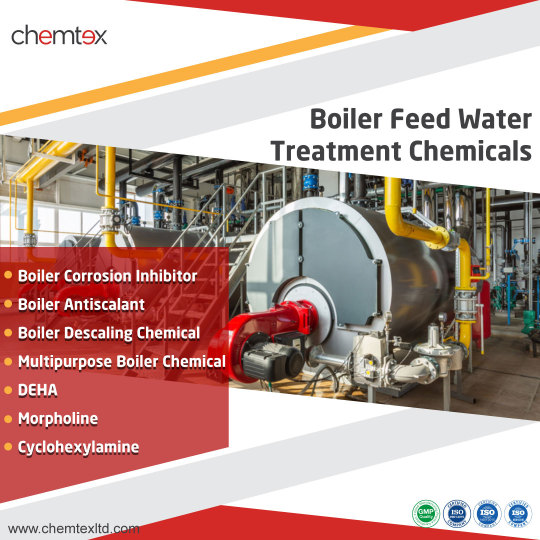
#chemtex#chemtexltd#chemicals#boilerchemicals#feedwater#treatment#sludge#corrosion#antiscalant#inhibitor#scavengers#wateradditives#manufacturer#supplier
0 notes
Text
#Metalworking fluid corrosion inhibitor#Cutting oil corrosion inhibitor#Water-soluble cutting oil corrosion inhibitor#Grinding fluid corrosion inhibitor#Corrosion inhibitor additive for metalworking fluids#Corrosion inhibitor additive for cutting oils#Corrosion inhibitor additive for water-soluble cutting oils
0 notes
Text
Engine Oil Additives Market - Forecast (2023 - 2028)
Global engine oil additives market is valued 10,853$ million in the year 2017 and is anticipated to grow at a CAGR of 3.2% during the forecast period 2018-2023.
#Engine Oil Additives market#Engine Oil Additives market size#Engine Oil Additives industry#Engine Oil Additives market share#Engine Oil Additives top 10 companies#Engine Oil Additives market report#Engine Oil Additives industry outlook#lubricant additives#anti-wear additives#corrosion inhibitors#friction modifiers#anti-foam agent#polymer additives
0 notes